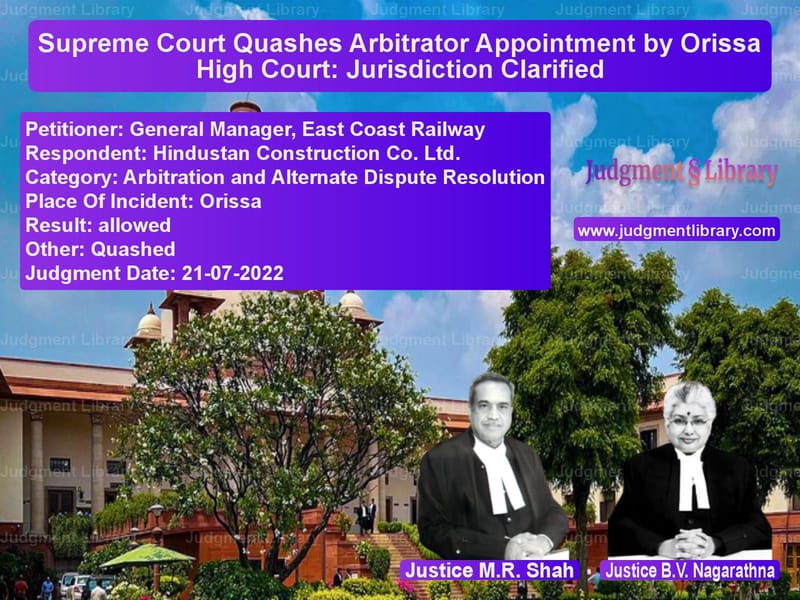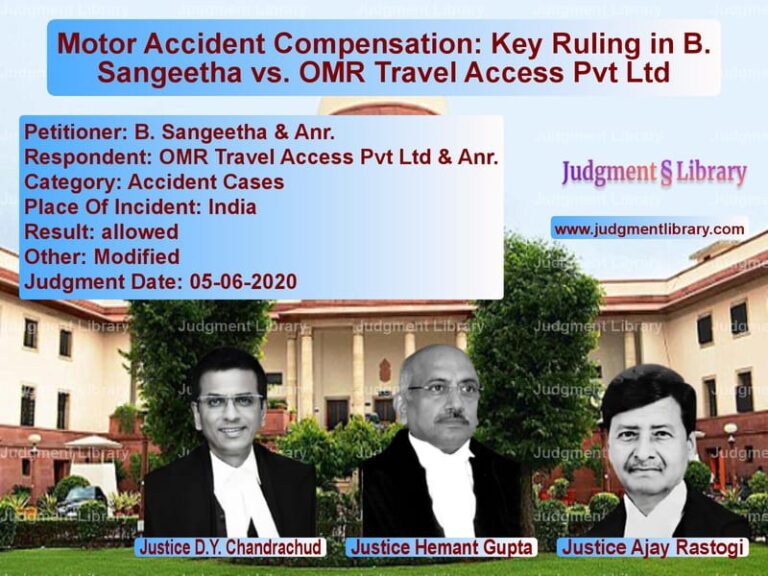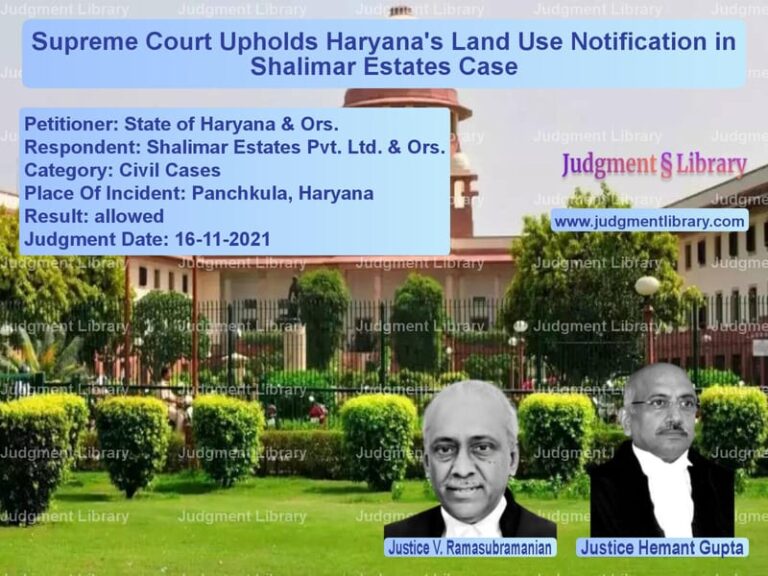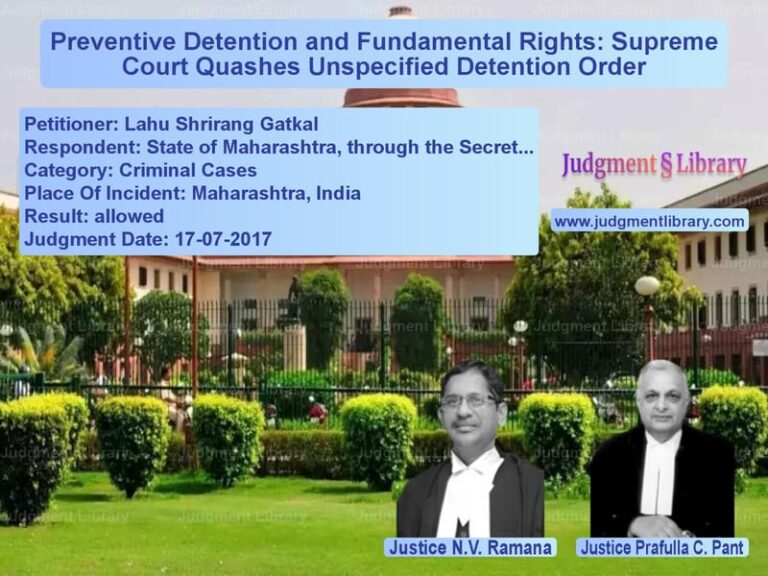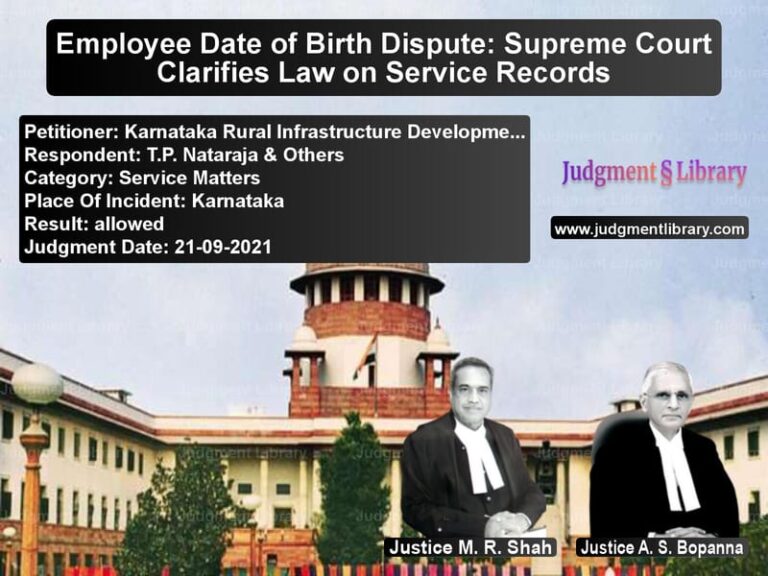Supreme Court Quashes Arbitrator Appointment by Orissa High Court: Jurisdiction Clarified
The case of General Manager, East Coast Railway vs. Hindustan Construction Co. Ltd. is a significant ruling on the jurisdiction of High Courts in appointing arbitrators under the Arbitration and Conciliation Act, 1996. The Supreme Court was called upon to decide whether the Orissa High Court had the jurisdiction to appoint an arbitrator when previous arbitration proceedings had already been initiated in another jurisdiction.
Background of the Case
The dispute arose out of a contract agreement dated November 29, 2018, between East Coast Railway and Hindustan Construction Co. Ltd. The respondent initiated proceedings under Section 9 of the Arbitration Act before the Additional District Judge, Visakhapatnam, seeking an injunction against the encashment of its performance bank guarantee and forfeiture of the security deposit.
The Additional District Judge, Visakhapatnam, granted an interim injunction restraining the forfeiture of the security deposit for six months.
Subsequently, the respondent wrote to the appellant on December 1, 2019, requesting the appointment of an arbitral tribunal to resolve the dispute, raising five claims.
Appointment of Arbitrator and Objection by East Coast Railway
The appellant appointed an arbitrator as per the arbitration agreement, and the arbitrator issued notices to both parties. However, instead of submitting its claim, the respondent challenged the validity of the arbitration tribunal and approached the Orissa High Court under Section 11(6) of the Arbitration Act, seeking a new appointment.
East Coast Railway opposed this petition, arguing that:
- The Orissa High Court lacked jurisdiction under Section 42 of the Arbitration Act, as the respondent had initially filed proceedings under Section 9 in Visakhapatnam.
- Since the dispute arose from a contract for work in Andhra Pradesh, the High Court of Andhra Pradesh at Amaravati had exclusive jurisdiction.
- The respondent’s move to file under Section 11(6) in Orissa was a way to circumvent jurisdictional limitations.
High Court’s Decision
The Orissa High Court, despite these objections, proceeded to appoint an arbitrator, stating:
“Since the appellant, East Coast Railway, is not opposing the appointment of an arbitrator, there is little purpose served in relegating the respondent to the appropriate High Court, as that will only delay the adjudication of disputes.”
Feeling aggrieved by this decision, East Coast Railway approached the Supreme Court.
Supreme Court’s Observations
A bench comprising Justices M.R. Shah and B.V. Nagarathna analyzed the facts and legal framework and made the following key observations:
- The jurisdiction of a court under Section 42 of the Arbitration Act is clearly defined: once an application under any provision of Part I of the Act has been made in one court, that court alone has jurisdiction over all future arbitration applications.
- The respondent had already filed proceedings under Section 9 of the Act in the Court of Visakhapatnam, meaning the Andhra Pradesh High Court had exclusive jurisdiction.
- The Orissa High Court had committed a serious error in entertaining the application under Section 11(6).
- East Coast Railway’s non-opposition to appointing an arbitrator did not automatically confer jurisdiction upon the Orissa High Court.
Final Judgment
The Supreme Court quashed the Orissa High Court’s order and ruled:
“Considering Section 42 of the Arbitration Act, the High Court of Andhra Pradesh at Amaravati alone would have jurisdiction to decide the subsequent applications arising out of the contract agreement.”
Read also: https://judgmentlibrary.com/arbitration-and-counterclaims-supreme-court-allows-nhais-counterclaim/
The Court allowed the appellant’s appeal and directed that if the respondent wished to seek the appointment of an arbitrator, it must approach the Andhra Pradesh High Court.
Key Takeaways
- Jurisdictional Consistency: Once arbitration-related proceedings begin in one court, all further applications must be made in the same jurisdiction.
- Section 42 is Binding: The Supreme Court reaffirmed that Section 42 of the Arbitration Act overrides general jurisdiction principles.
- Preventing Forum Shopping: The decision discourages litigants from filing arbitration applications in multiple jurisdictions to gain a perceived advantage.
- Judicial Oversight on Arbitrator Appointments: Courts must ensure jurisdiction before appointing arbitrators to avoid procedural violations.
Conclusion
The Supreme Court’s ruling in General Manager, East Coast Railway vs. Hindustan Construction Co. Ltd. provides clarity on the applicability of Section 42 of the Arbitration Act and emphasizes the importance of jurisdictional consistency in arbitration proceedings. By reinforcing that proceedings must remain within the originally chosen jurisdiction, the ruling prevents unnecessary litigation delays and ensures procedural fairness in arbitration-related disputes.
Petitioner Name: General Manager, East Coast Railway.Respondent Name: Hindustan Construction Co. Ltd..Judgment By: Justice M.R. Shah, Justice B.V. Nagarathna.Place Of Incident: Orissa.Judgment Date: 21-07-2022.
Don’t miss out on the full details! Download the complete judgment in PDF format below and gain valuable insights instantly!
Download Judgment: general-manager,-eas-vs-hindustan-constructi-supreme-court-of-india-judgment-dated-21-07-2022.pdf
Directly Download Judgment: Directly download this Judgment
See all petitions in Arbitration Act
See all petitions in Dispute Resolution Mechanisms
See all petitions in Institutional Arbitration
See all petitions in Commercial Arbitration
See all petitions in Enforcement of Awards
See all petitions in Judgment by Mukeshkumar Rasikbhai Shah
See all petitions in Judgment by B.V. Nagarathna
See all petitions in allowed
See all petitions in Quashed
See all petitions in supreme court of India judgments July 2022
See all petitions in 2022 judgments
See all posts in Arbitration and Alternate Dispute Resolution Category
See all allowed petitions in Arbitration and Alternate Dispute Resolution Category
See all Dismissed petitions in Arbitration and Alternate Dispute Resolution Category
See all partially allowed petitions in Arbitration and Alternate Dispute Resolution Category

